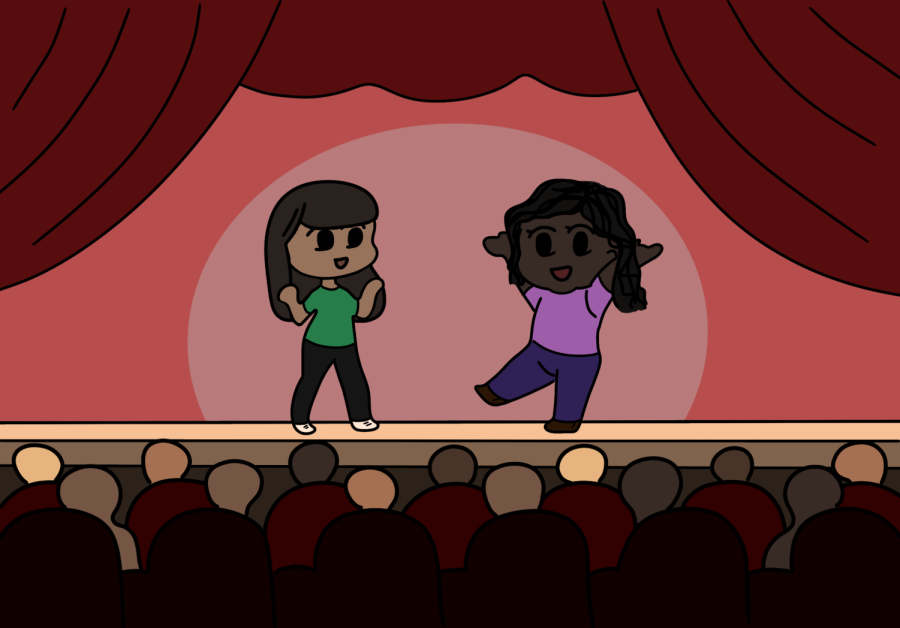BIPOC students and alumni spread joy and express themselves through comedy
Because comedy spaces are often predominantly white, BIPOC comedians aren’t always able to fully express themselves. However, BIPOC students and alumni are finding spaces and ways to share their authentic selves through comedy.
April 18, 2023
People often associate Asian American parents with the racist and harmful stereotype of the “tiger mom,” characterizing them as strict and boring.
But William Paik (Weinberg ’20) said he seeks to challenge these depictions in his work as a comedian — painting a new picture of his parents as funny and empowered people, while still recognizing the complexities of intergenerational Asian American relationships.
“Seeing them in situations of powerlessness made me want to write about them in (a new) way — they are funny, they are stronger, they can beat me in certain ways,” Paik said. “(Giving them) a little bit more humanity, you know?”
Many BIPOC comedians use comedy as an avenue to express themselves, telling jokes and stories authentic to who they are. Because comedy on campus and nationwide is a predominantly white, male space, these performers say it can be hard for BIPOC comedians to fully express themselves and make jokes related to their experiences.
Northwestern is home to at least seven different comedy and improv groups, but most of them are predominantly white.
On campus, many non-white comedians find a home in Out Da Box, NU’s multicultural sketch comedy and improv group. It was born out of the African-American Theater Ensemble on campus in the ’80s.
Communication freshman Jasmine Rao, a member of ODB, said being a part of the group and performing for predominantly BIPOC audiences means she doesn’t have to censor her jokes to cater to a white audience.
“It’s a very different style of comedy when you’re in a room with people who have been through these shared experiences, and it’s also a safe space,” Rao said. “It won’t make anyone uncomfortable to just speak your truth, no matter if it’s based on your race, sexuality or gender.”
At the start of the COVID-19 pandemic three years ago, “Saturday Night Live” inspired Rao to start writing her own comedy sketches. The pandemic was a difficult time for Rao and many others, she said, but comedy was an outlet for her to spread joy.
Rao is also a fan of Hasan Minhaj, a Muslim, Indian American comedian known for his satirical comedy about his experience as a South Asian son of two immigrants growing up in California.
She said she feels represented and understood watching Minhaj’s comedy, feelings she hopes to share with others through her performance at ODB’s Spring Show on April 28 and 29.
“Hopefully (people leave ODB shows feeling) empowered — like you can share your story and that you’re not alone,” Rao said. “Even though we’re making light (out) of some very difficult things, it’s a struggle for a lot of people, the things we’re sharing about.”
Weinberg senior Almaya Wiley-Yancy, co-president of ODB, agreed with Rao’s sentiment and said she hopes BIPOC comedians can gain more recognition in general and through spaces like ODB.
“I feel like a lot of POC comedians don’t get the same recognition as white comedians do — not that I regard myself as a comedian — but there should be so many more opportunities for POC on campus to get their own comedy out, do stand-up and do improv and write sketches,” Wiley-Yancy said.
ODB is a place where Wiley-Yancy said she feels like she’s able to make mistakes, and that the people around her encourage her to succeed and improve. Being around other BIPOC comedians creates an environment where she doesn’t feel tokenized for her identity and where she doesn’t have to speak on behalf of her entire community.
Despite originally being more shy and introverted, Wiley-Yancy said comedy has been an outlet for her to develop her self-esteem and confidence, allowing her to be more true to her “authentic self.”
Paik described stand-up comedy as a type of monologue, one where the audience is forced to listen to the performer. He said that oftentimes Asian American voices are silenced in media, professional spaces and society, and his ability to perform his monologue is a way of reclaiming his voice.
With the rise in anti-Asian rhetoric since the start of the pandemic and instances of anti-Asian violence like the Atlanta spa shootings, Paik said he feels like everyone had something to say. For him, stand-up comedy was a way to reclaim his narrative.
“There’s a lot of discourse in the media about (Asian Americans) like, ‘Asians are this way, Asians are that way,’” Paik said. “It’s rare that we ever get to talk about ourselves, and so stand-up is, for me, that talking about myself and being able to create information about yourself — information that you want out there.”
Email: katrinapham2024@u.northwestern.edu
Twitter: @KatrinaPham_
Related Stories:
— Profile: Students take their comedy Out of DaBox
— Chicago comedian and Northwestern alum William Paik to study Korean stand-up on Fulbright grant
— The Set-Up aims to break barriers, bring stand-up comedy to more students



